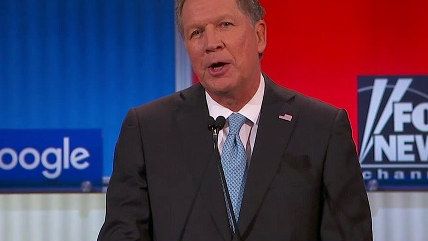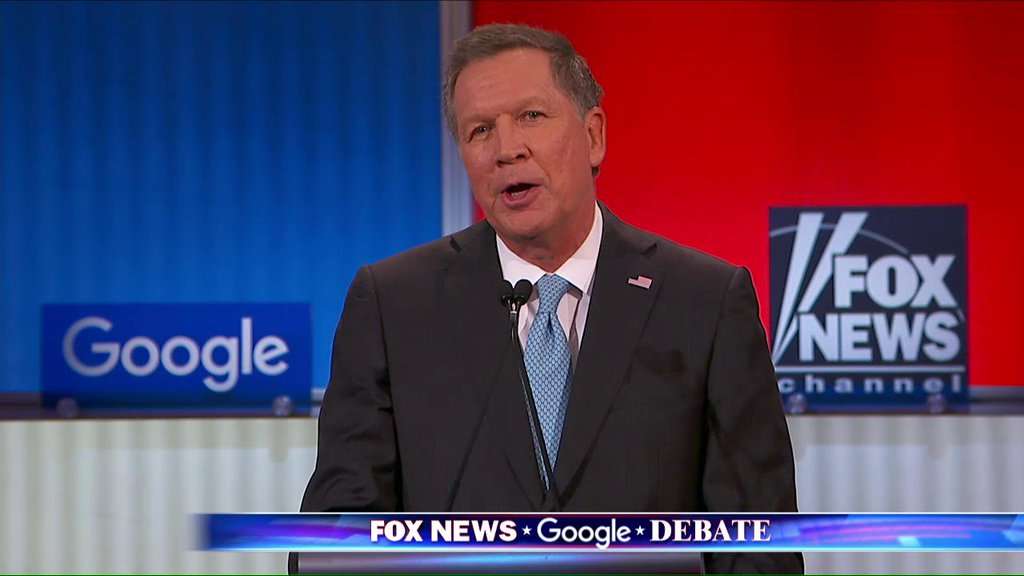Kasich: Shut Up and Let Your Political Masters Secretly Decide How to Break Your Encryption!
Gov. Kasich's response on security highlights politicians' lack of interest in dangers of mandating 'back doors.'


Let's predict that tonight's narrative will be "Gosh, there was an awful lot of policy discussion at this debate without Trump there!" While that's true, as somebody who has watched every single debate, I am not hearing much I haven't heard before. It might be pretty illuminating for somebody who might have been ignoring the debates but tuned in tonight. I'm not sure who that person might be.
There is one tech privacy issue that did not get much illumination, but not because it wasn't asked about. Moderator Megyn Kelly attempted to ask Ohio Gov. John Kasich about whether the federal government should mandate encryption back doors to be able to access data from smart phones and other devices in order to fight terrorism or crime. Things got kind of weird (transcript via the Washington Post):
KELLY: Governor Kasich, You appear to back in another debate, a so-called back door to encrypted cell phone technology, which protects most smartphones that we all have from hacking. And it includes our phones and it also protects the cell phones of the terrorists.
Now the tech companies and a group of MIT scientists, smart guys, right, warn that if they create a way for the FBI to have a back door into our encrypted communications, then the bad guys will exploit it too. And they say that this is going to cause more security problems than it would solve for everyday Americans. Are they wrong?
KASICH: Well, look the Joint Terrorism Task Force needs resources and tools. And those are made up of the FBI, state and local law enforcement. And Megyn, it's best not to talk anymore about back doors and encryption, it will get solved, but it needs to be solved in the situation of the White House with the technology folks.
KELLY: But this is public testimony.
KASICH: But I just have to tell you that it's best with some of these things not be said. Now I want to go back something.
And then he completely changed the subject. In a way, he didn't answer the question, but really, he did. The answer was, simply, that the American citizens don't get any say at all in how much privacy and security their data should have. Or else, the terrorists win!
His answer is strange, but in its own fashion, this is exactly how the encryption debate is going. Politicians like Kasich (and Jeb Bush and Hillary Clinton, and others) want the government to be able to get through encryption in the name of national security, but there is very little engagement in the reality that tech experts keep bringing up: There's no way to do this without opening up people's data to all sorts of potential breaches. So they say utter nonsense (like Clinton did in a previous debate) or like Kasich, they want to try to make even the discussion a matter of national security so that citizens have no idea what is going to happen.
And this is a problem because, as the tech experts warn, we will be the ones facing the risk and having our privacy violated with little recourse, or if Kasich has his way, little awareness that the risk even exists. Remember, in December the omnibus spending bill authorized new surveillance authorities of our data under the guise of fighting cyberterrorism. It was snuck in so relatively quietly that even the candidates seemed to be unaware it had happened and a couple of them were calling for its passage in the last debate.
The new authorities come with liability protection for companies that share their customers' data (as in, your data) with the government. That means, in the event that things go wrong, we are limited in our ability to turn to the courts to seek judicial remedy.
When Kasich calls for the media to keep their mouths shut and let politicians hammer out back door encryption access with tech companies, we should additionally be concerned that this will be their "solution" to the possibility that citizens could become more vulnerable to breaches, intrusions, and fraud. They could simply try to ease tech companies' fears by making it so that citizens won't be able to sue them.
It's easy to ignore Kasich's comments, because he appears to be such a non-factor in this race. But his attitude toward encryption is far from unique or unusual among politicians, even if his answer seemed bizarre.


Show Comments (17)